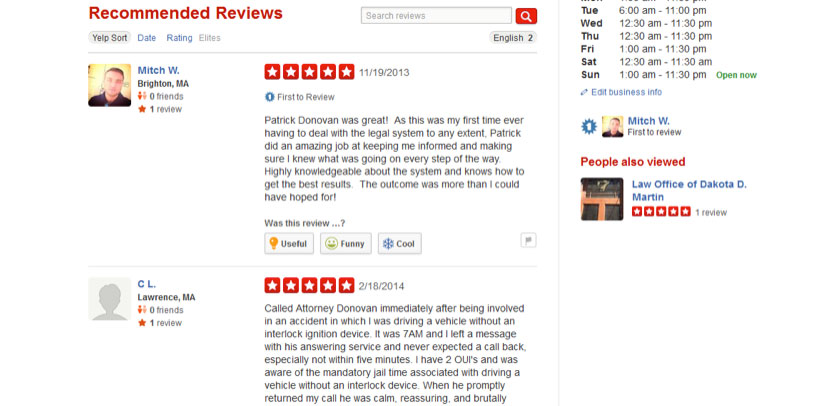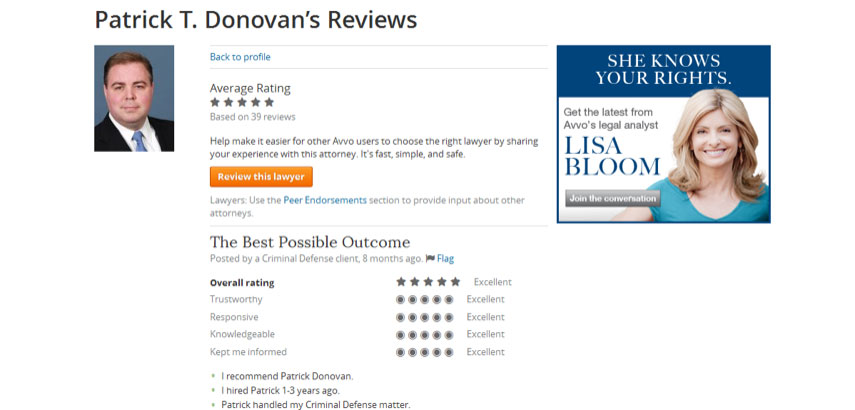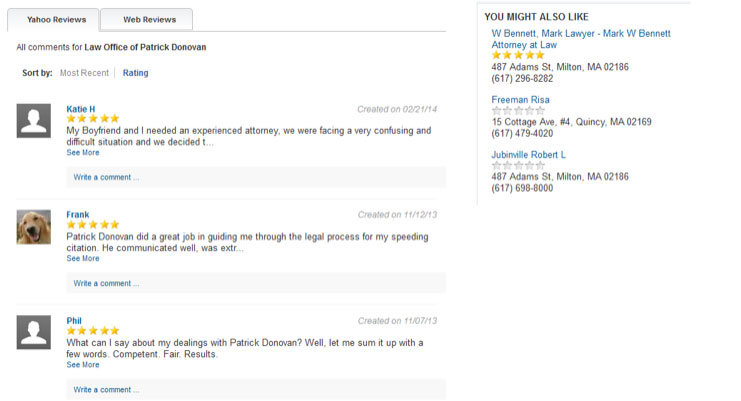If you follow this criminal defense attorney’s approach, you should be able to obtain a steady flow of positive online reviews.
Attracting potential clients to your website is only half the battle in winning new business for your law practice. The other half is getting them to trust you enough to hire you as their attorney. Online testimonials from existing clients can help greatly to both attract prospects and convert them into clients for your firm.
Attorney Patrick T. Donovan is a criminal defense and traffic appeals lawyer in Quincy, MA. Online client reviews have been highly instrumental in bringing a steady stream of new clients to his practice. “It’s not something that’s easy to track, but I can confidently say that testimonials and client reviews have been an unbelievable asset in marketing my practice,” he says. Since launching his online presence in 2007, Donovan has developed his process of testimonial gathering into a system that could be used by any attorney to expand their online presence and increase conversion of site visitors into clients.

Getting testimonials in all the right places
Donovan understands the importance of having client testimonials on his website, and displays dozens of them on his testimonial page, with a prominent link from his home page. However, he believes this is only a starting point. To maximize testimonial power, he also does everything possible to encourage client reviews on third party sites. These include review sites, local business directories, and social media profiles.
Testimonials on third party sites offer a number of benefits. Some people find them more trustworthy, since most cannot be edited by the lawyer reviewed. They can help boost search engine rankings (especially when they contain relevant keywords), since search engines consider customer reviews to be highly relevant. They can also be highly effective in encouraging casual searchers to click through to a law firm’s website.

Most sites require a business to set up an account before a client can leave a review. Registering is usually free and takes only a few minutes. Some of the most frequently used third party sites for leaving customer reviews include: Bing, Citysearch, Foursquare, Google+ Local, Insider Pages, Judy’s Book, Local.com, Manta.com, Merchant Circle, Yahoo! Local Listings, and Yelp!

Some social media profiles also provide space for customers and clients to leave testimonials. Attorneys who serve a professional clientele can encourage their clients to leave a recommendation on LinkedIn. This can be done either on a personal profile or on a law firm’s company page. (LinkedIn company page recommendations can only be written for specific products or services, so be sure to add these if you are planning to send clients to your page.) Facebook has also recently enabled starred reviews for business pages that list a physical address.
How to get a testimonial from your legal client
Donovan uses a series of simple steps he has developed to get a testimonial from nearly every satisfied client:
Always ask. It’s important to be proactive about gathering testimonials, not only for their obvious benefits, but because not doing so can harm your business. ”If somebody’s really mad at you, they’ll (go online and write a bad review) on their own. If they’re really happy with you, they might tell a couple of friends, but that’s usually about it. (If you want them to make it public) you have to lead them to water, make it easy for them. You have to coax them along in an honest way,” says Donovan. Encouraging reviews from satisfied clients can thus actually result in a more accurate online representation of your practice, and help neutralize the sting should you happen to get a bad review.
Ask right away. According to Donovan, the best time to ask for a testimonial is immediately, as soon as you have achieved a good outcome for their case.
“As we’re walking out of the courthouse I might say to them, ‘Listen, if you like me and you like the outcome you got, can I ask you a favor? Would you mind writing a testimonial for me, I’ll send you the link.’ Most of them, especially when they’re so happy, are more than glad to write one. Clients’ feedback has been great.”
Make it easy. “You want to make it easy for them, and not give them any obstacles to writing a review for you. What I do is try to identify where that person can write a testimonial on the web for me. For instance, if they’re coming in with a Gmail account, I’ll ask them to write a Google review. If they come in with a Yahoo account, I’ll send them there.”
Prepare the client for follow up. Clients may forget or procrastinate, or their testimonials may not get approved by the sites they’re submitted to. Once the client has agreed to write a testimonial, Donovan prepares them for follow-up.
Donovan uses review sites’ spam filters as a convenient – and legitimate – scapegoat. “’You may be hearing from me again because the site I’m going to send you to has a spam filter and they won’t let everything in. So if I keep bugging you, please don’t get mad at me, get mad at Google,’ I tell them. Then they laugh and they’re ok with it if I end up having to remind them.”
Watch for reviews to appear, and follow up if they don’t. Following up has three phases: keeping track of who has promised to write a review (easy to do with the help of an Excel spreadsheet); watching for the testimonials to show up on the review sites; and sending reminders if the reviews don’t show up.
It’s a good idea to give the client two or three weeks’ time before sending them a simple email reminder acknowledging that we are all busy, but asking if they could please take a couple minutes to complete the review. Explain again that sometimes the filters cause reviews not to show up and if that is what happened you’d really appreciate them trying again, to help get past the filters. Don’t forget to thank them!
“Do’s” and “don’ts” for 3rd-party testimonial sites
Keep these best practices in mind when encouraging your clients to review your practice online:
- While it’s a good idea to develop one or two “monster sites” with a lot of reviews, Donovan suggests also trying to get testimonials on as many different sites as you can. “You’d be surprised, no matter who your clients are, where they’re going to research you. Anything that’s written about you, even on some obscure site for lawyers, there’s a chance that it may come up in their random search, so more is more. Just put it all out there.”
- Look at – and respect – 3rd party sites’ terms of service. For example, when clients leave reviews on Google +, Google then owns those testimonials. “(Google is) scarier than the U.S. Attorney, and they don’t like you using their content,” says Donovan. So unless you know that the terms of service allow it, don’t use reviews from 3rd party sites elsewhere, including your own website.
- Direct the majority of your clients to sites where the terms of use allow it will result in more testimonials you can copy to your own website. However, it’s best not to shorten or edit these reviews – just paste them in whole.

- Don’t write your own testimonials. It’s virtually guaranteed to look fake, and is unethical.
- Do ask clients to write testimonials at home on their own computers, rather than signing them up for a review site and having them leave a testimonial before they leave your office. Google and other sites can track your computer’s IP address, and if they trace too many reviews to the same source, they will wipe them all out.
- Do keep yourself informed by attending marketing and SEO conventions and paying attention to online forums, because the “rules” can change suddenly and without notice.
After using his testimonial-gathering system for several years, Donovan reports tremendous success. “I won’t know it at first (when a client approaches me), but (after talking with them) it comes out a lot that they’ll say, ‘I hired you because you had more testimonials than the other person.’”
Building up your online reviews is a long term strategy that takes time and diligence. However, it’s one that can pay off in spades for the attorney who is willing to persist.



